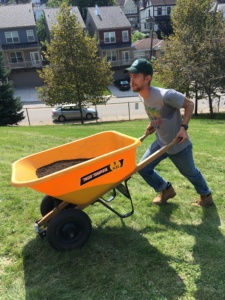This post is part six in a monthly series called Living our Values: first-hand accounts written by Grow Pittsburgh staff members illustrating the centrality of our organizational values in guiding our daily work.
In March, we’re highlighting our value of environmental responsibility, which dictates that we are “using, teaching and advocating for restorative practices”.
Read more from Community Garden Coordinator, Russ Thorsen, on how he sees this value carried out in Grow Pittsburgh’s work and stay tuned in the coming months as we continue to feature how we’re #LivingOurValues:
When I first began thinking about environmental responsibility, my mind was instantly drawn to sourcing materials. How, as a consumer, does Grow Pittsburgh choose responsibly manufactured products for our projects? Lumber for our raised beds comes from Ed Johnson of Wilderness Lumber Co. based in Butler County. Ed is a sustainable timber harvester as well as an excellent carpenter. We vet our Garden Resource Center soil amendments to make sure we are using products that are either naturally replenishable by the environment or are byproducts from industrial processes. For example, cottonseed meal, a great multi-use fertilizer and nitrogen source, comes from post-ginned cotton.
I quickly realized how absurd it is to root environmentalism within the vehicle of consumerism. Ethical sourcing is important, but it relies on the same system of overconsumption that led our society to its present-day environmental crises. To be truly environmentally responsible is to move past using purchasing power as the sole means of supporting sustainable initiatives, and instead actively attempt to change the status quo. What could be a better symbol of this idea than transforming unused parking lots with compacted soils into rich, productive, organic, soil based gardens?

Russ, pictured at the Mt Washington Community Garden
The fundamental principle of organic gardening is growing plants without using petrochemical fertilizers and pesticides. This demands the use of systems that act slowly. We plant native flowers that attract predators of garden pests. We rotate crops so no one particular spot becomes deprived of nutrients. We compost on-site to provide a steady stream of rich organic matter to feed our garden beds. We design a garden to be resilient, to anticipate problems, and solve them itself. A wise gardener once told me that organic growing is like treating heart disease with diet and exercise instead of waiting for the heart attack and then getting on medication. It is a preventive systems-based approach.
In our organic gardening basics class, I tell community gardeners that organic growers feed the soil, not the crop. We can nurture and encourage the growth of a diverse and vast soil microbiome that keeps our plants healthy. A handful of fertile soil has more microbes in it than there are humans on the planet. This statistic humbles me and makes me ask, “What do I want at the end of a growing season?” Of course I want juicy, one-pound tomatoes that burst with flavor. But this is secondary to my ultimate goal: to have healthy soil that provides harvests for generations. It is this long-term mindset that is at the heart of environmental responsibility.
I often feel paralyzed in the face of the large and daunting phenomenon of climate change. Community gardens give me hope–they serve as a testament to the positive change that a handful of motivated neighbors can accomplish. Our growing spaces provide a calm place to reconnect with the land, heal our soils, and heal ourselves. These spaces prove that we can change our city for the better, and inspire others to do the same.
Does this value resonate with you? Share this post on Facebook, Twitter, and Instagram, tag @growpittsburgh and #LivingOurValues and let us know what environmental responsibility means to you!
